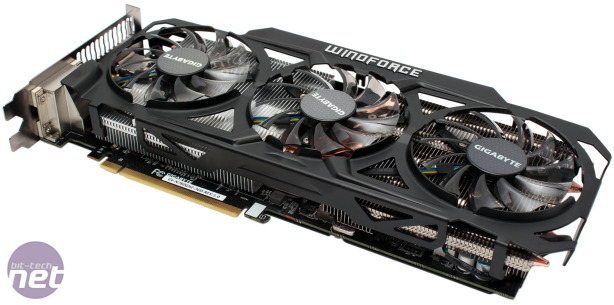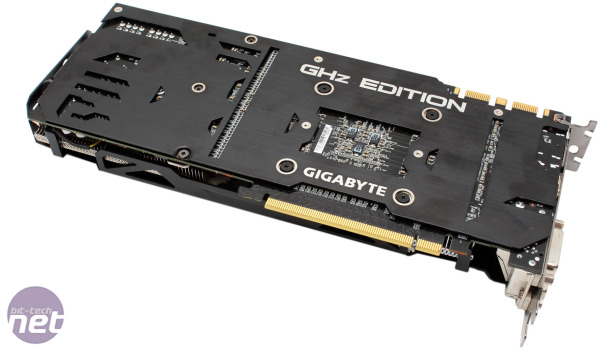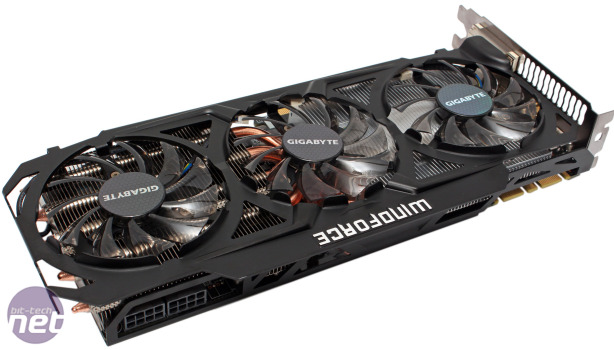Performance Analysis
The GTX 780 GHz Edition has big gains over the stock card in Battlefield 4 that essentially puts it on par with the GTX 780 Ti, give or take a couple of frames. At 2,560 x 1,440 and 5,760 x 1,080 it's 13 and 17 percent quicker than the vanilla GTX 780 and surpasses the AMD R9 290X, and even Sapphire's overclocked one. However, at 4K, it's unable to compete with the 290-series cards, which are optimised for this resolution.The Gigabyte card starts with a 16 percent increase in performance in BioShock Infinite compared to the stock GTX 780 at 2,560 x 1,440, where it stays at over 60fps for the whole benchmark, something no AMD card can yet do. Again in this game, its performance is very close to that of Nvidia's top end GPUs, with the clock speed boost proving very effective. Of particular note is the 4K result, as the card is much smoother than a stock speed one since frame rates no longer drop below 30fps.
Crysis 3 is our toughest game to run, but here the clock speed increase is again very effective for the Gigabyte GTX 780 GHz Edition, and it just manages to surpass the GTX 780 Ti in the single screen test. At 5,760 x 1,080 and 4K, no single card can really be considered playable, and performance differences at the high end are very small. Even so, the card holds its own well against the GTX 780 Ti, but Sapphire's overclocked R9 290X just comes out on top at these ultra high resolutions.
As you'd expect, Gigabyte's card has no issues with Skyrim, even using a three screen Surround set-up or 4K with the high resolution texture packs and maximum details settings. Again, the GTX 780 Ti is slightly ahead, and the R9 290X also creeps ahead again at 4K, but the differences between them all are small and meaningless in therms of the actual experience.
Unigine Valley closely reflects what we've seen in the games test. The Gigabyte GTX 780 GHz Edition is a mere 27 points behind the GTX 780 Ti, but a whole 17 percent ahead of the vanilla GTX 780. It also has a wide margin on the Sapphire R9 290X Tri-X, but Nvidia hardware does fare better in this test.
Power consumption is pretty high compared to the GTX 780, as the card draws almost 50W more under load. This is to be expected given the hefty overclock, but it does push the power consumption over that of the R9 290X, though in fairness it's typically faster than the R9 290X too. Thermal performance, on the other hand, we have no complaints about, and the card stays 12°C cooler than the stock model and 5°C cooler than the Sapphire R9 290X Tri-X too. As well as being cool, it runs quiet too. Its fans peaked at 53 percent, but we struggled to hear this over anything else in the test system.
The overclocked results are fantastic, as in Battlefield 4, Crysis 3 and Unigine the card is able to put distance between itself and the GTX Titan Black. It's also better when compared to the overclocks we managed with the Sapphire R9 290X Tri-X, though in Crysis 3 the two are neck and neck. System power consumption went up by another 22W to 441W at the overclocked settings (Sapphire's card caused it to exceed 500W when it was overclocked), but there was no temperature change, just an extra two percent of fan speed which was again difficult to hear.
Conclusion
We said in our Sapphire R9 290X Tri-X review that it was hard to recommend, mainly as the R9 290X itself is a little overpriced, and the performance of this card makes that even more apparent. It is consistently faster than the R9 290X but comes in a little cheaper, and it's also smaller than Sapphire's custom cooled one since it's a true dual-slot card. £385 is no doubt a lot to drop on a graphics card, but this card is still fairly priced in relation to the high end market.Gigabyte's card is a little bigger and more power hungry than stock GTX 780s, but these are worthy trade-offs for the hefty overclock and reduced noise. It's also blisteringly fast, and though we still wish manufacturers would be more daring with GPU memory overclocks, it's difficult to fault elsewhere.

-
Performance38 / 40
-
Features28 / 30
-
Value25 / 30


MSI MPG Velox 100R Chassis Review
October 14 2021 | 15:04












Want to comment? Please log in.